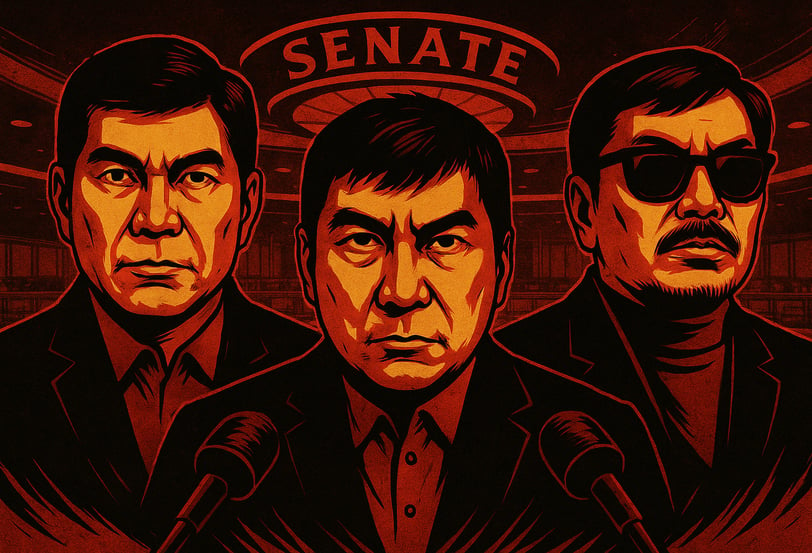Why Voting for Another Tulfo in the Senate Is a Bad Idea
This blog explores how the rise of the Tulfo brothers—fueled by media dominance and populist appeal—poses serious threats to democratic institutions, political diversity, and long-term governance in the Philippines. From “ipa-Tulfo mo” culture to dynastic ambitions, the piece unpacks why another Tulfo in the Senate isn’t just overkill—it’s a symptom of deeper political decay.


It’s Holy Friday. The streets are quiet, the air thick with the scent of fried tuyo—much to the chagrin of my American neighbor—and I’m cycling through coffee, laundry, and blog writing. Not at the same time, of course. It’s more like a rhythm: pour, type, rinse, reflect.
Laundry, incidentally, is my ultimate favorite water sport.
Somewhere between spin cycle and sip, I scroll past a clip. A woman crying. A man shouting. A Tulfo brother handling it all with the precision of someone who’s done this a thousand times—not as a judge, but as a brand.
It’s no longer clear whether it’s Raffy, Erwin, or Ben. The lines blur. The roles overlap.
And maybe that’s the real problem.
When justice becomes content and power becomes a family franchise, you start to wonder:
Is this still governance—or are we just watching the next episode?
From Broadcast to Ballot: The Tulfo Playbook
Raffy Tulfo didn’t need a political party to make himself a household name. He had Wanted sa Radyo.
For years, he sat behind a mic while people lined up to tell their stories—abandoned spouses, abused workers, scammed tenants. And right there on air, Raffy would call the boss, confront the cheater, or shame the landlord. No courtroom. No process. Just instant results. Or at least, the illusion of them.
It worked.
The phrase “ipa-Tulfo mo” became shorthand for swift justice. In a country where court cases can stretch into decades, and government hotlines go unanswered, Tulfo’s show felt like divine intervention. It was emotional, cathartic, and entertaining. Justice with a loudspeaker.
Then came the 2022 elections.
Raffy Tulfo didn’t just win a Senate seat. He dominated—with little more than a microphone, a YouTube empire, and the trust of millions who saw him as the only public figure who actually did something.
He didn’t have to promise anything. He’d already built a track record—in front of a camera.
Now, his brothers are doing the same.
Erwin and Ben Tulfo are riding the wave. The name, the formula, the fanbase—it’s all there.
Same style. Same soundbites. Same promise of justice without the paperwork.
But here’s the thing: the kind of justice they deliver on TV doesn’t—and can’t—exist in the Senate.
Governance isn’t a segment you can wrap up in ten minutes.
It’s rules, committees, bureaucracy, budget hearings, backchanneling, compromises, and a whole lot of waiting.
It's not made for views. It’s made for laws.
The Power of the Perfect Story
Raffy Tulfo didn’t win hearts just by being loud. He was smart about it.
He didn’t take every case. He chose the ones that hurt—the ones that exposed failure, demanded outrage, and promised redemption in ten minutes or less. The stories of abused wives, unpaid laborers, neglected seniors—he aired what the courts ignored. And in doing so, he built more than trust. He built relevance.
Academic research even points out how Wanted sa Radyo was praised for its sensitivity to vulnerable sectors, especially in cases involving violence against women and systemic neglect (Komunikasi). People didn’t just watch. They believed. They saw in Tulfo someone who took on the worst of the system and made it squirm.
That same instinct carried over to the Senate. His legislative priorities—worker protection, domestic violence prevention, media welfare—mirror the very issues that made his show go viral (Philstar).
But here's what we rarely talk about: not every person who walks into his studio gets justice.
If the case doesn't have the makings of a headline—if it’s quiet, complicated, or unlikely to go viral—Tulfo’s team will often shrug and suggest “Mag-usap na lang kayo. Amicable settlement.” No spectacle, no drama, no resolution televised for public consumption.
But when a case promises clicks, outrage, or public attention? That’s when the wheels turn. That’s when the team acts fast.
And this pattern is no accident.
This is formula.
A repeatable cycle: pick the right story, build public sympathy, win another election.
And now, with his brothers following the same script—Erwin and Ben stepping into the spotlight—it’s starting to look less like public service and more like a long game.
One that doesn’t end with the Senate.
Imagine that: President Tulfo.
Because when power is built on performance, and performance is backed by millions of subscribers, what’s stopping the next episode from being a campaign launch?
The Illusion of Transferable Power
People vote for the Tulfos because of their brand of immediate, televised justice—but let’s face it—he can’t do that in the Senate. There are rules. There are committees. There are alliances, hearings, budget debates, and a whole layer of politics that doesn’t respond to microphones or viral clips.
In his show, Raffy Tulfo calls the boss. He gets answers. He pressures people into acting. He moves fast because the camera is rolling and the audience is watching.
But the Senate doesn’t work like that.
There’s no call-in segment during plenary sessions. No split-screen confrontation. No quick fix while someone’s crying in the other line.
Inside that chamber, he’s just one of twenty-four. He doesn't control the airtime. He can't fast-forward the process. He has to file bills, sponsor them, defend them, revise them, and wait. And that—more than anything—is where the gap starts to show.
Because what works on TV doesn’t carry over to lawmaking.
You can’t resolve policy like a family feud. You can’t write laws with adrenaline. You can be loud, sure—but loud doesn’t mean lasting.
And while Raffy Tulfo has made noise, drawn attention to important problems, and shaken a few things loose—one is enough. Two is too much.
Bring in Erwin. Then Ben. Then maybe another cousin or two. And suddenly we’re not strengthening institutions—we’re crowding them out.
Same approach. Same punchlines. Same pattern.
Just a new face on the poster.
And we're supposed to pretend it's still about public service?
A Family Affair: Dynasties Disguised as Public Service
Raffy Tulfo is already in the Senate.
Erwin Tulfo is running.
Ben Tulfo is running too.
And that’s just the surface.
Other Tulfos are quietly holding posts, working in the background, or preparing for their own shot at office. Slowly, steadily, it’s turning into a family affair—one that’s creeping through government under the familiar cover of public service.
Ben Tulfo doesn’t see a problem. “We’re a dynasty in helping people, not in politics,” he said in an interview, brushing off the concern like it was just a title issue (Inquirer.net).
Erwin Tulfo doubled down. “We’re running for national posts,” he said. “So technically, it’s not a dynasty” (Inquirer.net).
But that’s not how dynasties work.
According to political science, it doesn’t matter if it’s local or national. A dynasty isn’t about geography. It’s about concentration of power within a single family—and the Tulfos are checking every box (ScienceDirect).
Worse, they’re doing it while pretending not to.
They talk about public service, about protecting workers and defending the poor. But behind that script is a more strategic move: take the trust they built in media, parlay it into Senate seats, and anchor themselves deeper into government.
Even Erwin Tulfo, who once said anti-dynasty laws are long overdue, still chose to run alongside his brother.
So much for setting an example (Inquirer.net).
Here’s the real problem with dynasties: they don’t just recycle faces. They block new ones from entering. They don’t just inherit name recall. They inherit control—over platforms, over messaging, over who gets to speak and who gets silenced.
And research backs it up. Areas dominated by “fat dynasties”—families with multiple members in power—tend to suffer from higher poverty rates and poor governance outcomes (Wikipedia).
Because when a family holds too much ground, people stop voting for platforms.
They just vote for names.
I mean, you already have a senator brother. If you have ideas, tell him. Let him do the job.
You already know political dynasties are a big problem in this country.
Dadagdag ka pa?
Bypassing Institutions Isn’t a Solution—It’s the Problem
We all know what “ipa-Tulfo mo” means by now—it’s become our go-to escape when the system fails us.
It’s fast. It’s public. And most of all, it works—at least on the surface.
Because let’s be honest: when you’ve spent months being ignored by barangay officials, when government hotlines go unanswered, when you’re told to file a blotter and wait—it’s tempting to just go to Tulfo.
But that shortcut comes with a cost.
Every time people run to a media personality instead of a public office, it sends the same message to government:
You don’t have to fix this. Someone else already did.
There’s a Reddit comment that put it plainly: “People are able to bypass ineffective government processes, but it also gives government a reason to remain ineffective.”
And that’s exactly what’s happening (Reddit).
When the Tulfo brand of justice takes over, we start treating institutions as optional.
Why go to DOLE when Tulfo can call your boss?
Why go to a women’s desk when you can get a public apology with millions watching?
Why fix the system when you can fix the optics?
This isn’t to say people don’t deserve help. They do.
But help delivered through microphones and Facebook shares isn’t sustainable.
It makes government even more dependent on personalities who aren’t elected to serve everyone—just the ones whose stories can trend.
And let’s not forget: the Tulfos built this brand inside media platforms that were supposed to be neutral. Erwin Tulfo, for example, left his post at PTV to run for Senate. That didn’t just raise eyebrows—it raised questions about how long this “public service” was really about the public (ErwinTulfo.com, Vera Files).
Because the more we rely on Tulfo to solve our problems, the more excuses we give to agencies who are supposed to do the job in the first place.
It looks like help.
But it becomes a reason not to fix anything.
Popularity Isn’t Policy—The Vote We Cast, the System We Shape
This was never just about the Tulfos.
It’s about how we keep rewarding visibility over vision.
We vote for the names we hear often—the ones we see on our screens, not the ones quietly doing the work.
Familiarity becomes credibility. Volume gets mistaken for value.
And in that setup, the Tulfos thrive.
Their authority doesn’t come from reform. It comes from reactions.
Not plans. Just presence.
We’ve stopped asking for real platforms. We’ve gotten used to public service being loud, emotional, and fast.
Confrontation is applauded. Soundbites get shared. And long-term thinking gets pushed aside because it’s “too slow.”
But the Senate isn’t built for virality. It’s built for policy. And when we forget that, we shrink the space where real governance is supposed to happen.
This isn’t just about the Tulfo family stacking power.
It’s about what we’re normalizing when we say yes to familiar faces with no long-term plan—again and again.
Because the more we accept this, the harder it becomes to reverse.
Every vote we cast shapes what government looks like next.
And what looks like a personal choice today? It turns into a pattern tomorrow.
This isn’t about hate. It’s not about discrediting everything one man has done.
It’s about being honest about what happens when we let performance replace public service—and call it politics.
We’ve seen what happens when power becomes a show.
Let’s not vote for a rerun.
Contact us
subscribe to morning coffee thoughts today!
© 2024. All rights reserved.


